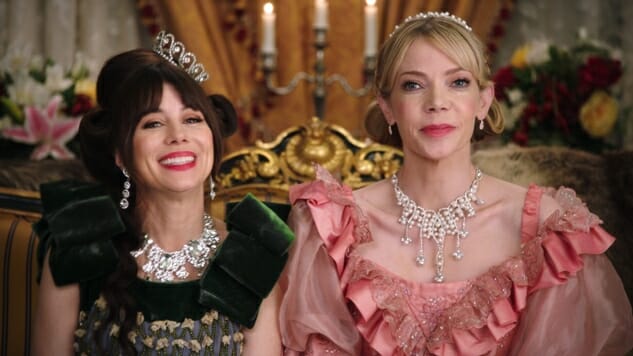Another Period Is Timelier Than Ever in Trump’s America
Photos courtesy of Comedy Central
Another Period returns to Comedy Central with its third season premiere tonight, and it couldn’t come any sooner. It’s been almost a year and a half since the last season ended, but the show’s pitch-black satire is more timely than ever. Since season two ended we’ve elected a president who brags about abusing women and treating them like objects; seen the longstanding dogwhistle racism of the right finish opening the door for blatant, unapologetic racism to slink back into mainstream discourse; and have had to prepare for a tax bill that disproportionately benefits the richest of the rich and that will basically return America to the Gilded Age. It’s like we’re living in 1900 all over again. Throw some hats and ball gowns on everybody and 2017 would look like Another Period.
If you haven’t seen Natasha Leggero and Riki Lindhome’s Comedy Central show before, it follows a rich family in the millionaire summer resort of Newport, Rhode Island, in the first few years of the 20th century, using their extreme wealth and the restrictive Victorian mores of the day to satirize both modern-day reality TV and how society treats women and the lower class. Leggero and Lindhome’s oblivious Bellacourt sisters see no problem with the money-focused, patriarchal world they live in, embracing their role as glorified trophies for the men in their lives. The Bellacourts treat the poor servants who live in their basement like they’re invisible at best and subhuman at worst, and blindly support both their rich father, even as he openly cheats on their mother, and their even less intelligent brother as he’s groomed for power. The one politically conscious Bellacourt, the suffragette sister Hortense, is openly mocked and hated by everybody else in the family, who treat her like an unpleasant, unattractive shrew who’ll never find a man to marry her. By adopting the regressive, discriminatory viewpoint of its turn-of-the-century setting, Another Period doesn’t just comment on the ridiculousness of our history, but spotlights how those archaic beliefs still impact our culture today.
-

-

-

-

-

-

-

-

-

-

-

-

-

-

-

-

-

-

-

-

-

-

-

-

-

-

-

-

-

-

-

-

-

-

-

-

-

-

-

-








































